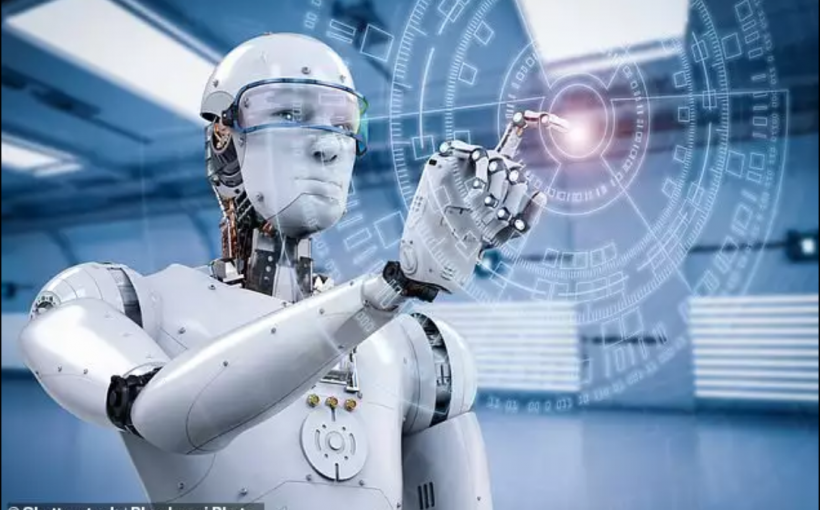Research shows AI can spot a host of conditions – ranging from cancer to rare eye diseases – with the same precision as medical professionals. The computer programs uses ‘deep learning’ to train itself to spot diseases by analysing thousands of medical images.
It draws on data from past health records to spot similarities in conditions and make an accurate diagnosis without human assistance. Doctors who led the review claimed AI has ‘enormous potential’ for improving the speed and accuracy of diagnosing conditions. Researchers analysed 14 trials which compared diagnoses made by AI and that of doctors between January 2012 and June 2019.
Results revealed the deep learning AI correctly detected disease in 87 per cent of cases – compared to 86 per cent achieved by doctors. AI’s ability to rule out patients who did not have disease was also slightly better – 93 per cent compared to the 91 per cent of medical professionals. However, the team at the University Hospitals Birmingham NHS Foundation Trust said more trials were needed because there was only 14 trials to go on. Lead author Professor Alastair Denniston said: ‘Diagnosis of disease using deep learning algorithms holds enormous potential.
‘Our review found the diagnostic performance of deep learning models to be equivalent to that of health-care professionals.’Professor Denniston added: ‘But it is important to note AI did not substantially out-perform human diagnosis. ‘From this exploratory meta-analysis, we cautiously state the accuracy of deep learning algorithms is equivalent to health-care professionals.’ He said more studies using AI in real clinical settings ‘are needed’.
Co-author Dr Livia Faes, of Moorfields Eye Hospital in London, added: ‘Evidence on how AI algorithms will change patient outcomes needs to come from comparisons with alternative diagnostic tests in randomised controlled trials. ‘So far, there are hardly any such trials where diagnostic decisions made by an AI algorithm are acted upon to see what then happens to outcomes which really matter to patients, like timely treatment, time to discharge from hospital, or even survival rates.’ Dr Peter Bannister, chair of the Institution of Engineering and Technology’s (IET) healthcare panel, was sceptical about whether AI could be implemented on a wide scale. He said: ‘The application of artificial intelligence (AI) techniques to diagnostics continues to attract considerable attention given the potential upside in terms of sensitivity, repeatability and throughput when applied to large, information-rich datasets, including medical images.
‘However, there has been limited adoption to date and moreover there exists scepticism as to whether these approaches can ever yield a net patient benefit when implemented at scale. ‘This comprehensive study clearly illustrates what is possible but also identifies the large evidence gap faced by nearly all groups who have tried to apply AI to diagnostics.’ The artificial intelligence in the study diagnosed a host of serious conditions from cancers, lung disease and heart problems.
‘Technology will make the NHS the best in the world and I want everyone who works in the health and care system to be empowered to embrace it – from porters to pathologists, surgeons to social care workers.’ However, the study has been met with cautious optimism by health experts across the country. Paul Leeson, professor of cardiovascular medicine at the University of Oxford, said: ‘This paper summarises the current state of research testing how well artificial intelligence identifies disease in a medical image compared to a clinician. ‘The review has been performed very carefully but real challenges were encountered trying to get a useful result.
‘The authors had to lump together findings from completely different medical problems and types of imaging, including research performed at a very early stage in the development. ‘They have also had to ask a very simple question, which is not really relevant to the majority of AI applications in Healthcare. ‘Clinicians are not likely to use results generated by AI in isolation, head-to-head with a computer, but rather combine the information from AI tools with other sources to decide how best to look after a patient.
‘Importantly the work highlights a new phase of research is needed, using more detailed trials, to work out the best ways to use artificial intelligence in healthcare.’ Richard Mitchell, professor of cybernetics at the University of Reading, said: ‘Great strides are being made in artificial intelligence, including the use of deep learning methods, and in some circumstances such systems can outperform humans. ‘One issue with deep learning is that, contrary to say an expert system (a computer system that emulates the decision-making ability of a human expert), it is not straightforward to “explain” why a particular outcome was reached. ‘There are some examples where a combination of human and artificial intelligence gives an even better result, and that may be the better route to take.’
Source: Dailymail


